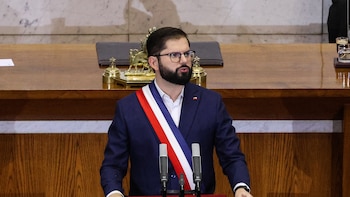
This Tuesday, March 29, at about six in the morning, Colombian Migration officials prevented Teodosio Pabón Contreras from boarding an American Airlines plane that took off at eight in the morning from Bogota's El Dorado Airport in the morning and made it available to the police. The newspaper El Tiempo revealed that the man was placed at the disposal of the authorities. This is alias 'el profe', former head of three blocks of the self-defense groups and adviser Carlos Castaño, leader of these illegal armed groups outside the law.
Man, because of his past, has clear restrictions on leaving the country by the Justice and Peace jurisdiction, in fact, he still has active proceedings against him. He intended to leave Colombia for the United States. On time, he was leaving for Florida, according to him, to carry out personal proceedings. Pabón was also known as Andrés Camilo and came to be named as the political chief of the Calima and Centauros bloc.
In July 2011, the newspaper El Espectador published a note titled 'Teodosio Pabón Contreras, 'the murderer', in which several of the reproachable acts that make his name continue to resonate in the file of the national authorities. At that time it was reported that Teodosio Pabón Contreras, alias 'El Profe', remembered for replacing Miguel Arroyave, a former paramilitary chief killed by his own subordinates in September 2004, at the negotiating table with the Government in the peace process with the Self-Defense Forces, would pay 31 years in prison.
In January 2014, it was reported that Teodosio Pabón Contreras, alias El Profe, had been sheltered with a measure to ensure preventive detention for the murder of Luis Hernando Caicedo León, a driver linked to the Cali Drivers' Union, Unimotor, committed on January 24, 2003. He was added in the case as co-author of improper material of the crime of homicide in a protected person.
Among the most resonant crimes in his name is the commission against three politicians in the Meta. The victims were Euser Rondón Vargas, former candidate for the Government of Meta; Nubia Sánchez Romero, deputy of the Meta Assembly, and Carlos Javier Sabogal Mojica, former governor of Meta. Their bodies were found on September 13, 2004 on the road from Briceño to Zipaquirá, Cundinamarca. He is accused of taking the victims to the scene of the murder.
The three people were killed, according to the investigation, because they had been denouncing alleged acts of corruption committed by Edilberto Castro Rincón, the former governor of Meta, who was initially sentenced in those days to 40 years in prison. It was on July 9, 2004 when Sanchez, Rondón and Sabogal denounced that the then governor had entered into irregular contracts, including the purchase of school supplies.
The victims were summoned, on the day of their death, to speak with the commander of the illegal group about their criticism of Governor Castro Rincón's administration. It was the teacher who, by telephone, gave them directions to the place where they would be violently attacked. They arrived at the La Esperanza farm, in the Canavita village, in Tocancipá, and were killed. The teacher has always insisted on his innocence on this case.
Likewise, Pabón, in a free version, declared that, through training schools, he recruited people in Córdoba to take to other regions of the country. This is how he nurtured this armed group. In 2002, in fact, the Calima block established political, ideological and military training schools that operated in the municipalities of Trujillo and Jamundí, in Valle del Cauca.
Keep reading:
Últimas Noticias
Debanhi Escobar: they secured the motel where she was found lifeless in a cistern
Members of the Specialized Prosecutor's Office in Nuevo León secured the Nueva Castilla Motel as part of the investigations into the case

The oldest person in the world died at the age of 119
Kane Tanaka lived in Japan. She was born six months earlier than George Orwell, the same year that the Wright brothers first flew, and Marie Curie became the first woman to win a Nobel Prize

Macabre find in CDMX: they left a body bagged and tied in a taxi
The body was left in the back seats of the car. It was covered with black bags and tied with industrial tape
The eagles of America will face Manchester City in a duel of legends. Here are the details
The top Mexican football champion will play a match with Pep Guardiola's squad in the Lone Star Cup

Why is it good to bring dogs out to know the world when they are puppies
A so-called protection against the spread of diseases threatens the integral development of dogs




